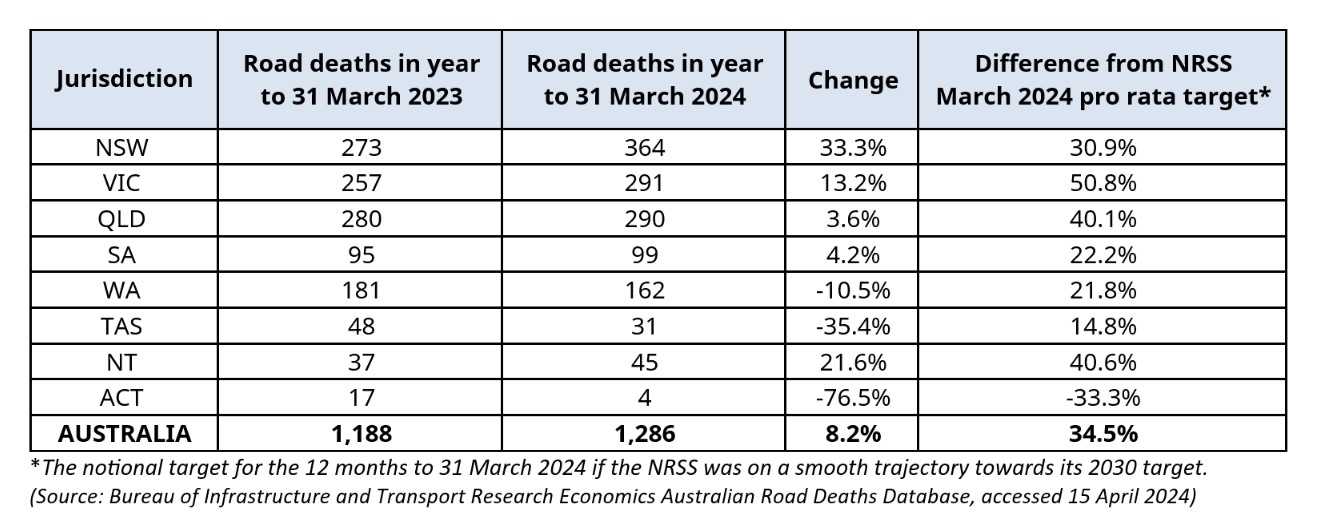The Federal Government must explain its continued refusal to implement the road safety reforms it announced just days before the 2022 Election, as new data shows Australia’s road toll continues to climb.

The nation’s peak motoring body says the Government needs to explain its continued refusal to implement the road safety reforms it announced just days before the 2022 Election, as new data shows Australia’s road toll continues to climb.
The latest edition of the AAA’s Benchmarking the Performance of the National Road Safety Strategy 2021-2030 shows road deaths jumped 8.2 per cent through the year to 31 March, with 1,286 fatalities recorded and significant increases seen in NSW (up 33.3%) and Victoria (up 13.2%). The report also shows a lack of data transparency means three of the Strategy’s five headline KPIs still cannot be measured or reported.

The data needed to understand the increases observed is being collected by state and territory governments, but it is neither being shared, nor publicly reported. The data describes each jurisdiction’s road quality, the causes of fatality crashes, and the effectiveness of respective law enforcement regimes.
The AAA and almost 20 other national safety-focussed organisations have since last October called on the Albanese Government to honour its pre-election commitment to: “extract better quality road data from the states and territories in return for funding of road projects.”
AAA Managing Director Michael Bradley said: “The continued rise in Australia’s road toll can’t be ignored any longer and the time has come for the Australian Government to fulfil its election promise and end the needless secrecy surrounding state-held road safety data.
“Australia needs a data-driven response to a problem killing more than 100 people every month, and as we enter another election year, it’s time our state and federal leaders showed their commitment to saving lives is greater than their desire to save marginal seats.”
The www.datasaveslives.org.au campaign calls for Australia’s new National Partnership Agreement on Land Transport Infrastructure Projects (which will dictate how $50 billion of Commonwealth road funding will be provided beyond 1 July 2024) to compel states to publish this critical road safety data as a condition of receiving federal money for roads.
This campaign is publicly supported by all National Party, Liberal Party, Greens, and Teal members of the House of Representatives, as well as independents Bob Katter, Helen Haines, Andrew Wilkie, and Rebekha Sharkie. Yet Dr Mike Freelander remains the sole Government MP to publicly endorse the initiative, which would save lives and help end the politicisation and pork-barrelling long-associated with road investment prioritisation across state and federal levels.
The AAA was heartened to last week hear Queensland Transport Minister Bart Mellish commit to releasing the requested data, telling ABC Radio he is: “really keen to provide whatever we’ve got on our books from Department of Transport and Main Roads to the Federal Government and to anyone who it helps.”
The AAA publishes its Benchmarking Report each quarter to track progress toward the nationally agreed National Road Strategy 2021-30, which was agreed by all Australian governments in 2021 and aims to halve Australian road deaths through the decade to 2030.
Data Saves Lives partners include Australia’s motoring clubs and 17 national organisations representing motorists, motorcyclists, truckers, pedestrians, doctors, insurers, road engineers and safety advocates.
The AAA’s Benchmarking Report is available at www.aaa.asn.au/knowledge-centre
For more information on data transparency see datasaveslives.org.au

The Albanese Government’s pledge to extract previously secret data about road trauma from state governments is the most significant national road safety reform in decades.
read more
The Queensland Government has agreed to share with the Commonwealth and the public previously secret data about the causes of car crashes, traffic policing and the condition of roads to help tackle the escalating road safety crisis.
read more
The quarterly update of the AAA’s EV Index shows Australians are continuing to shift towards electric vehicles and that internal combustion engines’ market share continues to decline.
read more